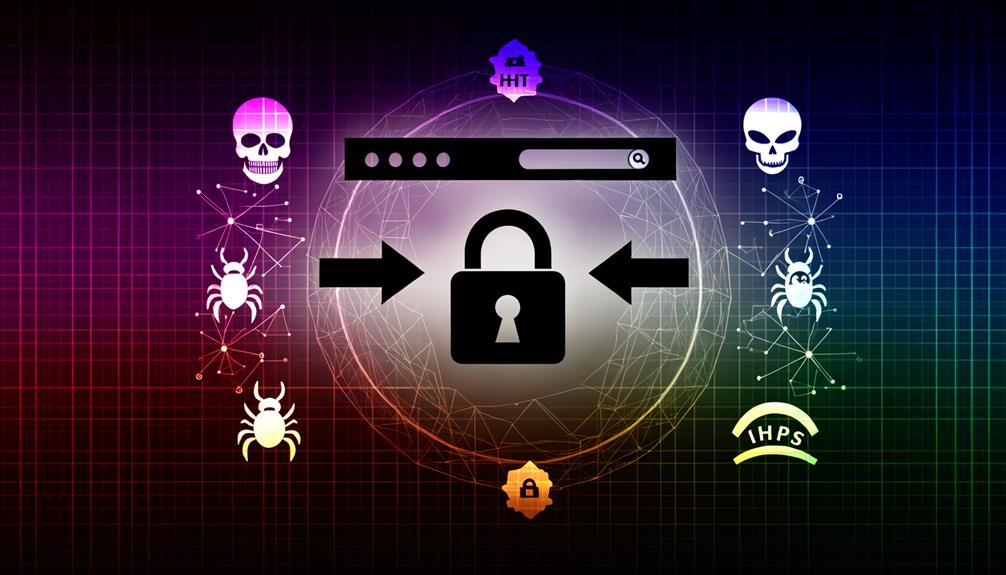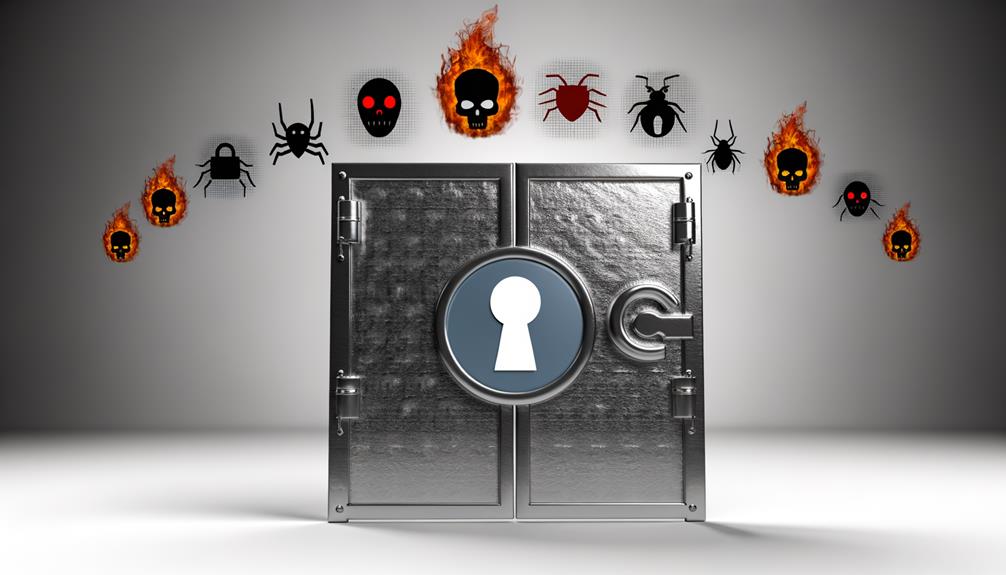In an era where cyber threats are increasingly sophisticated and persistent, securing your website is not just an optional luxury, but a necessity. It is crucial to understand that website security encompasses more than just safeguarding your data; it extends to protecting your website’s reputation, integrity, and the trust of your users.
We will explore a series of essential security measures encompassing password practices, software updates, SSL certificates, user permissions, and more. These strategies are designed to proactively mitigate potential threats and maintain the smooth operation of your website.
The question remains, are you equipped and ready to secure your digital footprint effectively?
Key Takeaways
Understanding Website Security Importance
Given the potential for significant financial and reputational damage, understanding the importance of website security is crucial for businesses of all sizes. Cybersecurity incidents can cost small to medium-sized businesses anywhere between $826 and a staggering $653,587, making the secure handling of web data a priority for both survival and growth.
A hacked website does not merely equate to financial losses. It can also lead to irreparable damage to a brand’s reputation and a severe loss of consumer trust. In our interconnected digital age, customers place immense value on data security. They expect businesses to keep their information safe and secure. Failing to meet these expectations can result in the loss of loyal customers and potential business opportunities.
Implementing robust security measures is not merely an option; it is an essential strategy to protect income streams and prevent reputational damage. A secure website acts as a safeguard, preventing the unauthorized use of sensitive data, ensuring trust and protection for both businesses and their customers. The detrimental effects of security incidents can be long-lasting, making website security a necessity rather than a luxury. Businesses must make securing their websites a top priority.
Common Website Security Threats
Recognizing the importance of website security, it is equally crucial to understand the common threats that pose risks to a business’s online presence and data integrity. The first of these threats are data breaches, a serious issue that can expose sensitive information stored on web servers, causing significant damage to a company’s reputation.
Another prevalent issue is the DDoS attack, where hackers overwhelm servers with traffic to disrupt website availability. Furthermore, website attacks such as SQL injection exploit security vulnerabilities, allowing hackers to manipulate or steal data.
The table below provides a brief overview of common website security threats:
| Threat | Description |
| Data Breaches | Expose sensitive information, affecting company reputation |
| DDoS Attack | Disrupt website availability by overwhelming servers |
| SQL Injection | Exploits security vulnerabilities, enabling data manipulation or theft |
| XSS Vulnerabilities | Allow attackers to inject malicious scripts into webpages |
| Ransomware Attacks | Encrypt website data, demanding payment for decryption |
Understanding these threats is the first step towards implementing effective website security measures, such as securing SSL certificates, to protect against data breaches and other potential risks. It is important to remember that no website is completely immune to attacks, making constant vigilance and proactive security measures essential.
Implementing SSL and HTTPS

In the realm of website security, implementing Secure Socket Layer (SSL) and Hypertext Transfer Protocol Secure (HTTPS) plays a pivotal role in encrypting data transmission, thereby protecting sensitive information from potential threats. By creating secure connections between users and websites, HTTPS prevents data interception, ensuring that the information shared remains confidential and integral.
SSL certificates serve a dual function – they authenticate the identity of a website and establish a secure connection with users’ browsers. This dual functionality is essential in safeguarding user data and maintaining website security standards. When a website lacks an SSL certificate, web browsers may flag it as insecure, leading to a significant erosion of user trust, a crucial factor for maintaining a robust online presence.
In essence, the implementation of SSL and HTTPS is not merely a technical decision but a strategic one. It encrypts data, reinforcing the defenses against unauthorized access and bolstering the sense of security of users. Therefore, these protocols are not just essential security measures but also tools to foster user trust and loyalty, making them indispensable in the world of website security.
Password Regulations and Updates
Navigating further into the labyrinth of website security, we encounter the crucial aspect of password regulations and updates. A cornerstone of password security, the creation of unique and complex passwords, serves as the first line of defense against unauthorized access. These passwords, comprising a mix of characters, safeguard the confidentiality and integrity of your website.
The strength of a password lies in its complexity and length. An optimal security measure suggests a password length around eight characters, but longer is often better. This complexity, coupled with uniqueness, acts as a formidable shield to protect sensitive data and thwart potential security breaches.
But, the process of ensuring password security doesn’t end with creation. Regular updates, preferably every three months, are essential. This practice, akin to changing the locks on your doors, adds an extra layer of security, keeping the potential intruders guessing and your website secure.
Restricting Administrative Access

A pivotal aspect of maintaining website security lies in the prudent restriction of administrative access, a measure that effectively curtails the risk of unauthorized changes or breaches. Limiting administrative access to essential personnel is crucial in reducing the likelihood of security threats. It is vital to ensure that only necessary individuals have access to sensitive information.
Role-based access control is an effective method to fine-tune the extent of access granted. By assigning specific permissions based on job responsibilities and duties, this approach allows businesses to manage their internal resources efficiently. Periodic review and update of access privileges are also necessary to ensure alignment with operational needs.
The introduction of multi-factor authentication for administrative accounts adds an extra layer of security. This measure, combined with robust password management, can significantly enhance the defense against potential breaches.
Furthermore, continuous training of administrators on best practices for secure access, password management, and identifying potential security threats is a proactive approach to ensure the website’s security. In conclusion, restricting administrative access is a critical, yet often overlooked aspect of website security, requiring a comprehensive approach for maximum effectiveness.
Importance of Regular Backups
While restricting administrative access serves as a formidable line of defense against potential security breaches, it is equally critical to adopt consistent data backup strategies for robust website security. Regular backups act as a safeguard, protecting your website data from security threats and ensuring a quick recovery in the face of data loss.
The importance of frequent backups cannot be overstated. They minimize downtime in the event of a cyberattack or system failure, keeping your website operational and your audience engaged.
Automated backup solutions streamline the backup process, effortlessly securing your data and providing peace of mind. A well-implemented backup strategy is a proactive measure that mitigates the risks of unexpected events and security breaches.
Consider the following table illustrating the benefits of regular backups:
| Benefits of Regular Backups | Description |
| Quick recovery | Minimize downtime, ensuring your website remains accessible |
| Protect website data | Secure valuable data against security threats |
| Proactive measure | Prevent devastating data loss, allowing for business continuity |
Advantages of Web Application Firewall

The implementation of a Web Application Firewall (WAF) presents numerous advantages for bolstering website security.
A WAF’s primary role is to block malicious traffic and prevent unauthorized access, significantly mitigating the risk of common threats such as SQL injection and cross-site scripting.
Selecting a reliable, robust firewall is crucial as it serves as a proactive defense mechanism, offering real-time monitoring and protection against an ever-evolving landscape of cyber threats.
Firewall’s Role in Protection
Serving as a robust barrier between your website server and incoming traffic, Web Application Firewalls (WAFs) meticulously filter out malicious requests, offering an essential layer of protection against prevalent threats such as SQL injection, cross-site scripting, and brute force attacks. By blocking suspicious traffic and preventing unauthorized access, WAFs significantly enhance website security.
A cloud-based WAF, in particular, provides scalable security solutions, adeptly adapting to ever-evolving cyber threats. This proactive measure not only safeguards your website and data from cyberattacks but also ensures your website’s integrity—maintaining the trust of its users.
Therefore, the role of a WAF is paramount in a comprehensive security strategy, serving to protect against threats while contributing to a sense of belonging among users.
Selecting a Reliable Firewall
In selecting a reliable firewall, understanding the multifaceted benefits of a Web Application Firewall (WAF) is crucial, given its potential to reduce security incidents by up to 70%, provide real-time threat protection, and block malicious traffic. The application of a WAF yields multiple advantages:
Multi-factor Authentication Explained
Adding an extra layer of security to your online accounts, Multi-factor Authentication (MFA) requires users to provide multiple forms of verification to authenticate their identity. This user verification method is a critical aspect of cybersecurity, designed to prevent unauthorized access.
MFA enhances account security by requiring more than a simple password. Typically, it includes something the user knows, like a password, something the user has, such as a phone, and something the user is, like a fingerprint. This integrated approach dramatically escalates the difficulty for cyber attackers to breach an account, providing sensitive information protection.
By adding an additional authentication step, MFA reduces the risk of unauthorized login attempts, thereby offering a robust mechanism for data breaches prevention and identity theft protection. Even if a password is compromised, the account stays protected as the attacker would need the additional authenticating factors to gain access.
In a world where cyber threats are increasingly sophisticated, MFA provides a reliable and effective authentication security measure. It may seem cumbersome to some users; however, the security benefits it offers significantly outweigh the slight inconvenience. In essence, MFA is a proactive strategy, fundamental to the protection of your website from threats.
Monitoring and Security Audit Importance

The criticality of regular security audits and effective monitoring techniques cannot be overstated in the context of website security measures.
Security audits serve a dual purpose by identifying vulnerabilities and providing insights for enhancing existing security mechanisms.
Concurrently, monitoring techniques play an instrumental role in identifying anomalous behavior, thus enabling early detection and mitigation of potential security breaches.
Importance of Regular Audits
Ensuring the security of a website necessitates regular audits, a crucial practice that aids in the identification of potential vulnerabilities and threats. This key component of website security measures allows for the detection of suspicious activities and potential breaches.
Regular audits play a pivotal role in: 1. Preserving data integrity by ensuring that the information remains accurate and consistent over its entire lifecycle. 2. Maintaining confidentiality by preventing unauthorized access to sensitive data. 3. Mitigating threats by identifying and addressing security issues promptly. 4. Validating the efficacy of security measures, ensuring they are up-to-date and capable of thwarting the latest threats.
In essence, regular audits are integral to robust website security, fostering a sense of belonging among users by ensuring their data is safe and secure.
Effective Monitoring Techniques
In the realm of website security, in addition to regular audits, effective monitoring techniques emerge as another vital element, serving as a proactive approach towards detecting security issues and potential vulnerabilities in a timely manner. This process, when implemented continuously, can significantly enhance your website’s security posture.
Monitoring provides the ability for a quick response to security incidents, ensuring threats are mitigated before they can inflict substantial damage. Security audits, on the other hand, allow for the identification of weaknesses that demand improvement and remediation.
| Monitoring | Security Audits | Outcome |
| Detect security issues | Identify weaknesses | Improve website security posture |
| Quick response to threats | Remediation of vulnerabilities | Prevent security incidents |
| Continuous monitoring | Regular audits | Sustained security improvement |
This symbiotic relationship between monitoring and security audits is essential for maintaining a robust, secure online presence.
Frequently Asked Questions
What Are the Security Measures to Secure a Website?
To secure a website, implement robust password policies, SSL certificates, regular updates, and firewall. Use secure hosting, two-factor authentication, malware scanning, defined user permissions, data encryption, and conduct vulnerability testing for comprehensive protection.
What Are the 3 Main Ways to Prevent Security Threats?
To effectively shield your site from security threats, prioritize robust password strength, regular software updates, and firewall implementation. Additionally, SSL encryption, secure hosting, and a solid backup strategy are vital safeguards. User education is also key.
What Are 5 Ways of Making Sure You Keep a Website Secure?
To ensure website security, enforce strict password policies and two-factor authentication. Regularly update software, utilize SSL certificates, implement firewalls, perform malware scans, manage user permissions, choose secure hosting, encrypt data, and use security plugins.
What Are the Need to Protect a Web Site?
Website protection is crucial to prevent unauthorized access, secure sensitive data, and safeguard reputation. Implementing measures like data encryption, SSL certificates, strong passwords, firewalls, regular backups, and antivirus software ensures a secure digital environment.
Conclusion
In conclusion, a robust website security strategy is paramount in this digital age. Implementing SSL certificates, stringent password regulations, restricted administrative access, regular backups, and multi-factor authentication are significant steps towards achieving this.
The addition of a web application firewall and regular security audits further fortify the website’s defense mechanisms. By incorporating these measures, organizations can effectively safeguard their online presence, protecting both their confidential data and maintaining the trust of their users.


